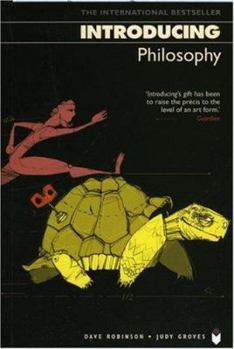Introducing Philosophy
(Part of the Graphic Guides Series and Introducing Graphic Guides Series)
Select Format
Select Condition 
Book Overview
An enjoyable, comic-style book which is a perfect introduction to some of humankind's most far-reaching ideas. This description may be from another edition of this product.
Format:Paperback
Language:English
ISBN:184046576X
ISBN13:9781840465761
Release Date:August 2004
Publisher:Icon Books Company
Length:176 Pages
Weight:0.55 lbs.
Dimensions:0.6" x 5.5" x 8.2"
Customer Reviews
5 ratings
Covers the Waterfront well
Published by Thriftbooks.com User , 14 years ago
This is a quick and dirty introduction to Philosophy. It defines the primary questions of philosophy as: What is the nature of reality? What makes humans special? What is mind or consciousness? Can we be certain of anything? What is a valid argument? How should we behave towards each other? And: How should society be organized? Philosophy, the author tells us is a discipline organized to pursue answers to these and many similar questions. The major subcategories of the discipline are: Epistemology (questions about knowledge), Metaphysics (questions about the nature of time, space, god, cause, reality), Ethics (questions about good and evil), Aesthetics (questions about art and beauty), and political philosophy (questions about the organization of society). How these questions are pursued, has to do with methodology, the tools used to answer the questions. Some believe that answers should evolve out of debate: that is out of the mechanics and art of how to ask questions properly. Others believe that "thinking about thinking" and questioning everything is the best tool. The book of course does not take sides on this important issues but proceeds to delve into the history and personalities of Philosophy beginning with the Egyptians who were good mathematicians but poor philosophers. But it then moves on to the Greeks who, at least in the Western World, are the acknowledged inventors of philosophy. They did this of course by challenging the worldview of religion. It was the Greeks who first refused to believe that religious answers were all there was to reality. They wanted to know what reality was made of? The preliminary answer they got was that it was made of air, fire, earth and water. Pythagoras however believed that mathematics held the secret to reality. And then, before the pre-Socratic era ended, came the "atomists," who believed that all matter could be "reduced" or broken down into ever smaller constituent components until the smallest possible, the atom was reached. However, it was Socrates who believed that wisdom was a skill that could be taught and that virtue is knowledge, and who formally introduced thinking as a methodology. He and his contemporaries wrestled with questions such as "If we believe different things, how do we determine who is correct?" Ultimately, it was Socrates' view that man had to question everything, especially authority that got him condemned to death by "democrats" who forced him to drink hemlock. Despite this, it was his student Plato, who advanced the techniques of using "thinking about thinking" as the ultimate tool of philosophy. Through dialogue using a series of nested questions deductible from a central premise, Plato was able to prove that thought was indeed the ultimate instrument for answering the questions that revealed the underlying truths of philosophy. He also introduced the idea of ideal forms and most famously, the parable of the cave, in which reality was seen to be indistinguishable fr
Perfect quick reference
Published by Thriftbooks.com User , 19 years ago
For a long time I have looked for a one-page reference that could show me all the major philosophers, a quick sound bite about what each of them believed, and which school of philosophy each of them belonged to. This book has that on the last page. The addition of this little gem to what is already a great reference material for a basic understanding of philosophy earns this book 5 stars. If you are like me and would like to know something about everything (not everything about something) this book will serve you well.
philosophically clueless--until today
Published by Thriftbooks.com User , 21 years ago
Passing through my daughter's college bookstore I came across "Introducing Philosophy." Since I knew my younger son had a summer assignment which involved studing classical and Renaissance authors, I thought this book would be a great foundation. I read the first 67 pages on the plane returning home from my daughter's university, and couldn't wait to read the rest of the book. I haven't finished it yet, because my son is reading it and he says it's "crystal clear" and is helping him with his assignment---SCORE!!!!
Fantastic Introduction to Western Philosophy and Ideas
Published by Thriftbooks.com User , 21 years ago
This is an excellent introduction to the history and great minds of western philosophy. Even if you are not new to philosophical writing you will enjoy this book since it avoids "wordiness" so many other books in this area are guilty of. My only complaint about the book was the awful artwork that lends little or nothing to the information being presented. Between the amateurish drawings and the pictures of the moronic looking punk girl I found it really distracting to the overall flow of this outstanding book. The book is still a great deal, and worth every penny to someone interested in thinking deeper.
Gives a good feel of the thinkers and issues
Published by Thriftbooks.com User , 23 years ago
This book gives a good feel for the major Western philosophers ranging from the ancient Greeks to Descartes, Hume, Hegel and Kant to Nietzsche, Marx, Feuerbach, Dewey and Sartre and how they have investigated epistemology, metaphysics, ethics, aesthetics and political forms. If you don't grasp everything completely don't worry; some of these fellows, particularly the post-modernists, need to be operated on by Ockham's razor.





